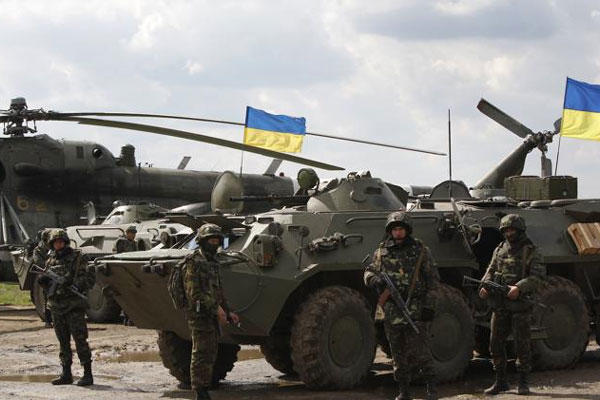The U.S. has put on indefinite hold on Ukraine's urgent requests for arms shipments to shore up the Ukrainian military in the faceoff with separatists in eastern Ukraine and Russian troops on the border, senior White House officials said Monday.
The senior officials spoke amid reports of increasing violence in eastern Ukraine. Officials in Kharkiv, Ukraine's second-largest city, reported that Kharkiv Mayor Gennady Kernes had been shot in the back while riding a bicycle near a local highway in what appeared to be an assassination attempt.
"We do need to recognize that there's not a silver bullet of some type of military assistance that is going to level this playing field in this very difficult situation," a senior White House official said when asked about Ukraine's pending requests for U.S. weaponry.
"There's not going to be any scenario where the Ukrainian military is brought up to parity with the Russian military," the official said.
The U.S. has already provided Ukraine with 300,000 Meals Ready to Eat. Last week, Defense Secretary Chuck Hagel said an additional $8 million in "non-lethal" aid was being sent to the Ukrainian military and border guards to include, sleeping bags, generators, helmets and communications equipment.
Hagel also said following talks with Polish Defense Minister Tomasz Siemoniak that 600 paratroopers from the 173rd Airborne Brigade in Vicenza, Italy, were being sent in 150-troop units to Poland, Lithuania, Latvia and Estonia for joint training exercises that would last through the end of the year.
At the Pentagon, Army Col. Steve Warren, a military spokesman, said all 600 troops had arrived in Poland and the Baltic states and they would soon begin training leading up to live fire and combined arms exercises.
Several members of Congress, including Senate Minority Leader Mitch McConnell, R-Ky., and Sen. John McCain, R-Ariz., have called on President Obama to send arms to Ukraine. However, White House officials on Monday said the focus was on non-lethal assistance and economic sanctions against Russia and close associates of Russian president Vladimir Putin.
The White House announced that the U.S. had frozen the assets and imposed visa bans on seven "cronies" of Putin, and also sanctioned 17 Russian companies in reprisal for Moscow's current actions in Ukraine and the previous takeover of Crimea.
In the Philippines, President Obama said that the sanctions were not meant to target Putin personally or his rumored overseas bank accounts.
Instead, the sanctions were designed to encourage Putin "to change his calculus with respect to how the current actions that he's engaging in in Ukraine could have an adverse impact on the Russian economy over the long haul," Obama said.
Moscow quickly denounced the new sanctions, which followed on previous moves against Russian businesses and individuals.
Sergey Ryabkov, Russia's deputy minister for foreign relations, called the sanctions "meaningless, shameful, and disgusting."
"The sanctions are the doing of Washington and Brussels, but they do not solve the problems of Ukraine and do not facilitate national dialogue, disarmament and withdrawal of military units," said Andrei Kelin, Russia's representative to the Organisation for Security and Cooperation in Europe (OSCE).
On Sunday, pro-Russian separatists in the flashpoint eastern Ukrainian town of Slavyansk put on display eight Western observers from the OSCE and offered to trade them for militants jailed by Ukraine.
A senior Obama administration official said that Slavyansk was "becoming quickly the Bermuda Triangle or Mafia central of eastern Ukraine."
A senior Ukrainian government official called the new sanctions "a very good step, but we hope it's not the final step. Sector sanctions would be the really painful measure."
The so-called "sectoral" sanctions being contemplated by the Obama administration would target specific sectors of the Russian economy, such as banking and energy.
-- Richard Sisk can be reached at richard.sisk@monster.com





























